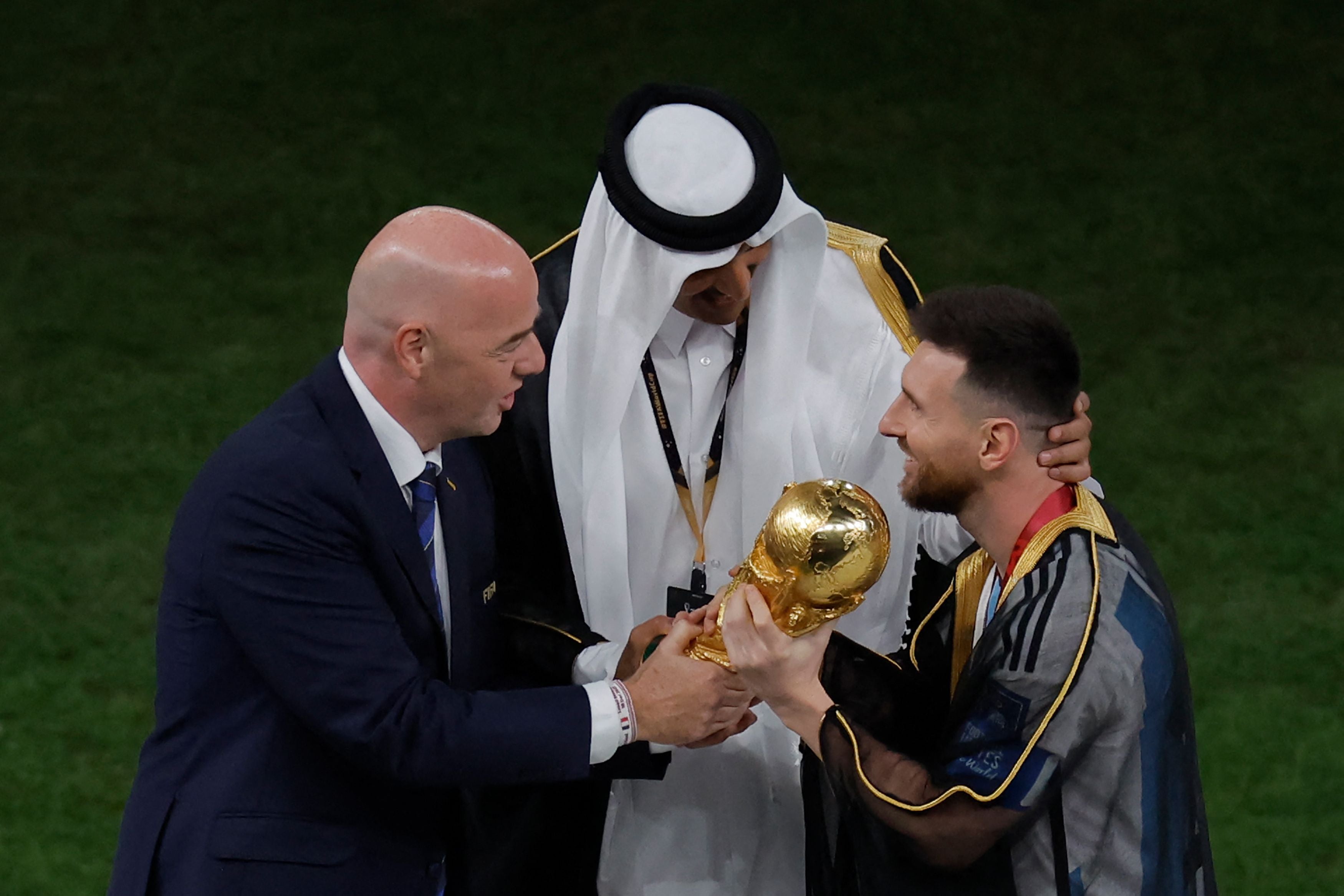Qatar’s billions get the picture they paid for
The Argentine superstar was given the traditional robe moments before the crowning moment of a legendary career
It was a moment that Lionel Messi had imagined all his life, and he has long had pictures of it in his head, they just might not have looked much like this.
As the Argentina captain at last went to lift the World Cup itself, his team’s crest wasn’t visible, and you could barely see the famous blue and white stripes.
That was already unprecedented for a moment of such symbolism that teams often insist on changing into their home shirts if they play in the away colours. It was exactly what Spain did in 2010.
That iconic shirt wasn’t really visible on Messi, though, because he was wearing a bisht. It’s a garment that Middle Eastern dignitaries wear over a thawb on formal occasions, as a mark of special achievement.
It should immediately be acknowledged that this could have been quite a beautiful thing.
It’s just impossible to separate it from the complicated context. Messi was given the bisht by Qatar’s autocratic ruler, for the moment of maximum visibility that goes down in history, at the climax of a competition this autocracy has been using for political purposes. That is inherently political, to say the very least.
It ensured that, in Argentina’s moment, there was the emir’s gift, front and centre. That, by extension, put Qatar front and centre, forever associated with this immortal image in a manner that had been the grand calculation of this entire tournament.
It’s the same idea that means Doha is forever associated with great goals and moments, just like the Azteca, say, with Diego Maradona or Pele. It ensures the wider discussion of Qatar is diluted by these positive images. It is a subtly powerful thing.
It is why this is one final act of sportswashing. There have already been some significant counter-arguments and pushback to that, in a way that has happened throughout this World Cup.
One is that the bisht is common throughout the Middle East and not just Qatar, so this should only be looked on in terms of the culture, and is obviously a great honour. That’s of course true but this isn’t about the garment or gesture. It’s about who is doing it, why and when.
Again, that it has come from the ruler of an autocracy means it is deeply political. Nothing about this World Cup can be free of politics.
As one human rights activist who has worked on Qatar and the wider Middle East said to TheIndependent: “It’s a clear attempt to foreground the host over the winners and of course the orientalism charge is their default. It’s pretty obvious what they are doing and why.”
A similar response is relevant to the widely spread photo of Pele in a sombrero at the Azteca in 1970. It wasn’t at the iconic moment of lifting the trophy, having been given to him by an autocratic ruler.

The actions of these sorts of leaders should not be so blithely passed over. No previous captain has ever had something put on them by a figure of such power at the instance of winning the trophy.
Many will also point to the benign nature of the gesture. It might be soft but that’s the entire point of soft power. There are more complicated elements to this, too.
Messi is a player of Paris Saint-Germain, who are of course owned by the Qatari state. The Argentina captain is also a tourism ambassador of Saudi Arabia.
Amid all of this, it’s impossible to say this was some simple cultural honour. It was a symbolic moment, in a World Cup that has been about image as much as anything else.
Qatar has spent an awful lot, up to $220bn. It now has a picture that goes beyond value.
Join our commenting forum
Join thought-provoking conversations, follow other Independent readers and see their replies
Comments


Bookmark popover
Removed from bookmarks